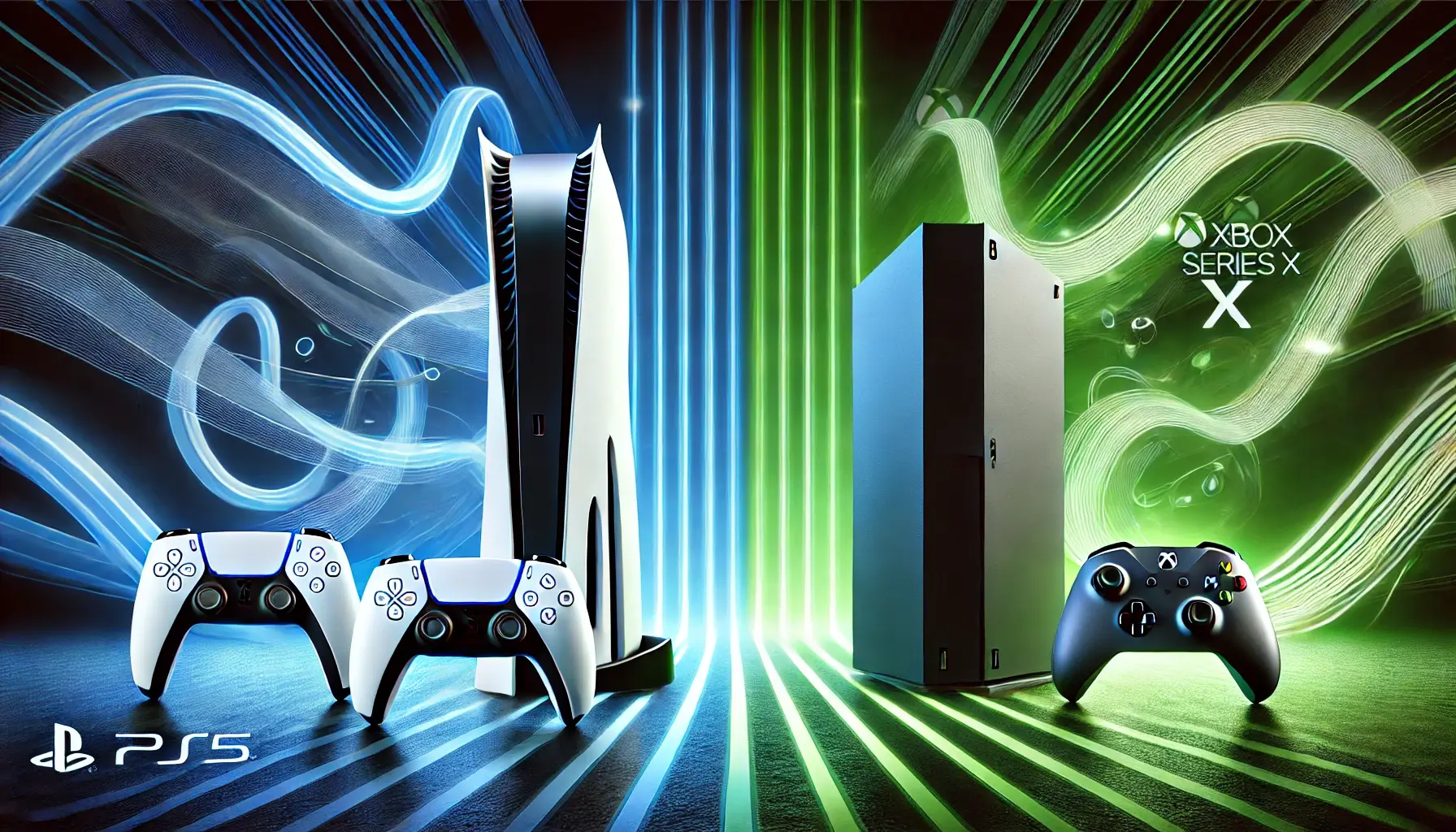PlayStation 5 (PS5) vs Xbox Series X


The 9th generation of gaming consoles has ushered in a new era of interactive entertainment, with Sony’s PlayStation 5 (PS5) and Microsoft’s Xbox Series X leading the charge.
Let's start with a comparison of the PlayStation 5 (PS5) and Xbox Series X based on their features:
| Feature | PlayStation 5 (PS5) | Xbox Series X |
| Release Date | November 12, 2020 | November 10, 2020 |
| Price | $499.99 (Standard Edition) | $499.99 |
| Digital Edition | PS5 Digital Edition ($399.99) | Xbox Series S ($299.99) |
| CPU | 8-core AMD Zen 2, 3.5 GHz (variable frequency) | 8-core AMD Zen 2, 3.8 GHz (3.6 GHz with SMT) |
| GPU | Custom RDNA 2, 10.28 TFLOPs, 36 CUs at 2.23 GHz | Custom RDNA 2, 12 TFLOPs, 52 CUs at 1.825 GHz |
| RAM | 16 GB GDDR6 | 16 GB GDDR6 |
| Internal Storage | 825 GB Custom NVMe SSD | 1 TB Custom NVMe SSD |
| Expandable Storage | NVMe SSD Slot (officially licensed only) | Proprietary 1 TB expansion card |
| Optical Drive | 4K UHD Blu-ray Drive | 4K UHD Blu-ray Drive |
| Resolution | Up to 8K | Up to 8K |
| Frame Rate | Up to 120 FPS | Up to 120 FPS |
| Ray Tracing | Yes | Yes |
| Backward Compatibility | Most PS4 games, some PS3/PS2 via PS Now | Most Xbox One, Xbox 360, and Xbox games |
| Game Streaming | PlayStation Now (PS Now) | Xbox Cloud Gaming (xCloud) |
| Virtual Reality (VR) | PS VR (Compatible with PS5) | Not directly supported, future plans hinted |
| Audio | Tempest 3D AudioTech | Dolby Atmos, Windows Sonic |
| User Interface | New, redesigned UI with Control Center | Updated UI similar to Xbox One |
| Subscription Services | PlayStation Plus, PS Now | Xbox Game Pass, Xbox Live Gold, Game Pass Ultimate |
| Exclusive Games | Titles like Demon's Souls, Spider-Man: Miles Morales | Titles like Halo Infinite, Forza Horizon 5 |
| Controller | DualSense with adaptive triggers, haptic feedback | Xbox Wireless Controller (updated design) |
| Dimensions | Approx. 390mm x 104mm x 260mm | Approx. 301mm x 151mm x 151mm |
| Weight | Approx. 4.5 kg | Approx. 4.4 kg |
Key Differences:
- GPU Power: Xbox Series X has a slightly more powerful GPU with 12 TFLOPs compared to PS5's 10.28 TFLOPs.
- Storage: Xbox Series X offers 1 TB of storage compared to the PS5's 825 GB, although both support expandable storage.
- User Experience: PS5 emphasizes the DualSense controller with advanced haptic feedback and adaptive triggers, enhancing the gaming experience, while Xbox Series X focuses on backward compatibility and Game Pass integration.
- Subscription and Services: Xbox Game Pass offers a broader library with day-one releases, which has been a significant selling point for Xbox Series X.
- Design: The PS5 has a more distinctive, futuristic design, whereas the Xbox Series X is a more compact and minimalist rectangular box.
Design and Build Quality

PS5: Sony’s PlayStation 5 has a striking, bold design that immediately sets it apart. It features a futuristic aesthetic with a curvy white and black color scheme and blue LED lighting accents. The PS5 is quite large, which might make it a tight fit for some entertainment centers, and its design has polarized opinions—some love its modern, innovative look, while others find it too ostentatious.

Xbox Series X: In contrast, Microsoft’s Xbox Series X adopts a more practical design. It’s a monolithic, rectangular tower resembling a mini PC with a sleek, matte black finish. Its minimalist design allows it to blend more seamlessly into a home theater setup. The Xbox Series X is also more compact than the PS5, making it easier to fit into smaller spaces. The choice between the two often comes down to personal preference, but in terms of practicality and space efficiency, the Series X has a slight edge.
Hardware and Performance
PS5: Under the hood, the PS5 is powered by a custom AMD RDNA 2 GPU and a Zen 2-based CPU, similar to its competitor. It boasts a slightly lower 10.28 teraflops of GPU power, but it compensates with a highly efficient architecture and a custom 825GB SSD that features incredible data throughput speeds of up to 5.5GB/s. This results in virtually no loading times, allowing for more immersive and seamless gaming experiences.
Xbox Series X: The Xbox Series X, meanwhile, packs a bit more punch with its 12 teraflops RDNA 2 GPU and an eight-core Zen 2 CPU clocked at 3.8 GHz. It also features a custom 1TB SSD with 2.4GB/s raw I/O throughput. While on paper, the Series X has a more powerful GPU, the differences in real-world performance are often negligible for most players. Both consoles handle 4K gaming exceptionally well and are capable of delivering smooth, high frame rates.
User Interface and Experience
PS5: Sony has redesigned the PlayStation UI for the PS5, offering a cleaner, more intuitive experience compared to the PS4. The new Control Center provides quick access to essential features without leaving the game, including notifications, settings, and friends lists. One of the standout features is the Activity Cards, which offer hints, progress tracking, and the ability to jump directly into different parts of a game.
Xbox Series X: Microsoft has opted to keep a similar UI to the Xbox One for Series X, with a few refinements. This consistency makes the transition easier for long-time Xbox users. The Quick Resume feature is a significant highlight, allowing players to suspend multiple games at once and switch between them seamlessly. The Xbox UI is snappy and integrates deeply with Microsoft's ecosystem, including Game Pass, Xbox Live, and the upcoming xCloud.
Game Library and Exclusives

PS5: Sony has traditionally excelled in the realm of exclusive titles, and the PS5 continues this trend. Games like “Demon’s Souls,” “Ratchet & Clank: Rift Apart,” “Returnal,” and “Spider-Man: Miles Morales” showcase the console’s capabilities and provide unique experiences that are not available on other platforms. The PS5 also supports a vast library of PS4 games through backward compatibility, with many titles receiving enhancements.

Xbox Series X: Microsoft has been acquiring studios to bolster its first-party lineup, and it’s starting to pay off with titles like “Halo Infinite,” “Forza Horizon 5,” and upcoming games from Bethesda, such as “Starfield.” The Series X’s backward compatibility is more comprehensive than the PS5, offering support for a wide range of Xbox One, Xbox 360, and even some original Xbox titles, often with enhancements like higher resolution and faster frame rates.
Services and Backward Compatibility
PS5: Sony offers PlayStation Plus, which provides free monthly games, cloud saves, and online multiplayer. The newer PlayStation Plus collection offers a selection of some of the best PS4 games for PS5 owners. Additionally, PlayStation Now offers a subscription-based game streaming service, although it’s not as robust as its competitor’s offerings.
Xbox Series X: The Xbox Game Pass is a game-changer. Often referred to as the “Netflix of gaming,” it offers a vast library of over 100 games, including all first-party Microsoft titles available on launch day. Game Pass Ultimate also includes access to EA Play and cloud gaming, making it an unparalleled value proposition. For backward compatibility, the Xbox Series X’s comprehensive support for older Xbox titles adds significant value for long-time Xbox fans.
Controllers

PS5: The DualSense controller is one of the PS5’s most impressive features. It boasts adaptive triggers that provide varying levels of resistance and haptic feedback that offer a more immersive and tactile experience. These features allow players to feel different textures and sensations in the game world, adding a new dimension to gameplay. The controller also features a built-in microphone, a USB-C port, and an improved battery life over the DualShock 4.

Xbox Series X: The Xbox Wireless Controller for the Series X has received minor refinements over the Xbox One controller. It features a slightly smaller and more ergonomic design, a new textured grip, and a redesigned D-pad for improved precision. The Xbox controller is still widely regarded for its comfort and familiarity, making it a great choice for long gaming sessions. It lacks the advanced haptic feedback of the DualSense but includes a share button for easy media capture.
Price and Value
PS5: The PS5 comes in two versions: the standard edition with a disc drive, priced at $499, and the digital edition, which lacks a disc drive, priced at $399. The digital edition provides a more affordable entry point into next-gen gaming, albeit at the cost of not being able to play physical media.
Xbox Series X: The Xbox Series X is priced at $499, which puts it on par with the standard PS5. Microsoft also offers the Xbox Series S, a less powerful digital-only version of the Series X, priced at $299. The Series S is a cost-effective alternative for those who don’t need 4K gaming but still want to experience next-gen performance.
Conclusion




